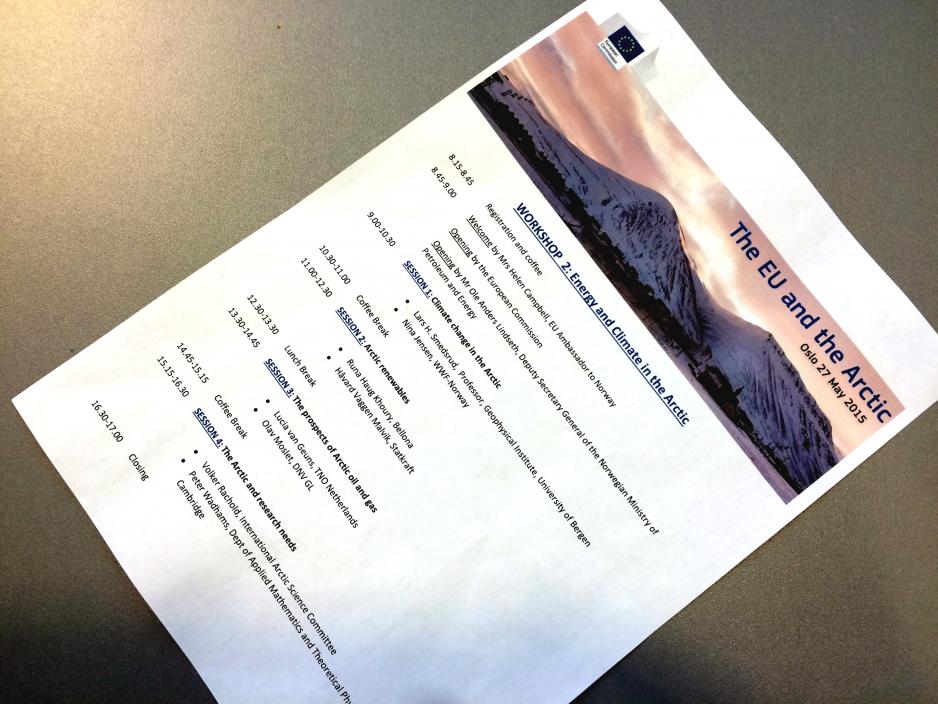Editorial Comment: Not a "bloody Northerner"

- Bloody Northerners, wrote the poet Harald Sverdrup, characteristically ironic, in 1972. The same year, most Northerners said no to EF. This coming Wednesday, the EU will hold a workshop about the Arctic. Without a single “bloody Northerner” on the list of presenters.
Her finner du den norske versjonen av denne kommentaren.
Harald Sverdrup was from Lofoten and he mastered irony better than most. He often aroused anger and consternation, but was just last year honoured with his own gala performance, sponsored by Hålogaland Theatre. The concert played to a full house.
When the EU arranges a workshop about energy and climate in the Arctic, without a single voice from the North, they might also have a full house. The programme, however, is intended as anything but ironic. Rather, the programme is quite conscious, and therefore decisive, in relation to the Arctic agenda the EU wishes to set.
Symbolic politics
The Arctic is important for the EU. The Arctic produces raw materials that the European market needs, but it is also an important geopolitical arena for European politics. Particularly, it is about symbolic politics and, not least, the issues of environment and climate.
The EU is also on the threshold of obtaining permanent observer status in the Arctic Council, following a policy decision in 2013. However, political complications, such as the EUs stance on sealing and, lately, the Ukraine crisis, have made such a status more complex.
Now, as the EU musters for a workshop about energy and climate in the Arctic, it is neither the first nor the last time that the High North is on the organization’s agenda. The meeting, which the EUs ambassador to Norway Helen Campbell is set to open, will be held in Oslo.
The EU is important for us
While the Arctic may be important for the EU, the EU is no less important for the Arctic. Today, it is not about saying yes or no to the EU, as was the case in 1972 and 1994. It is about access to markets and political influence. Above all, it is about the EUs knowledge about what goes on in the North.
In some cases, and particularly at the crossroads of energy and environment, the contradictions between the EU and, for example, Norwegian interests are pretty clear, especially in relation to industrial activities in the North. If there is internal opposition in national quarters, this is no less between trendsetters in the EU and northern Norwegian industry. The issues relate to both traditional industry and utilization of energy surplus in the North.
The relatively heated debate about climate-based energy transfer from the North to the European market, versus utilization of this energy for local and regional industry, is illustrative.
It is, therefore, of more than symbolic interest whom the EU chooses to invite, and what they plan to discuss, when the organization arranges a major workshop about the High North, Thursday May 27.
For those of us who live in the North, and who are concerned with commercial political development in the North, we can compare participation in the conference to walking into a room, unannounced, where everyone is talking about you.
The central issues are absent at the same time as the presenters, those defining the terms of the discussion, share the common characteristic of not belonging to academic, political or industrial arenas in the geographic areas that are the focus of the conference.
A professor from the University of Bergen and Nina Jensen from the WWF will address climate-related issues. As far as environmental organizations go, the WWF has a relatively poor foothold in the North.
Statkraft and Bellona will address issues relating to sustainable resources, while TNO Netherlands and DNV GL are set to illuminate questions around oil and gas.
Representatives from Cambridge and the International Arctic Science Committee have been recruited to discuss the importance of research.
Overlooking the North
The EU has completely overlooked the expertise at UiT Norway’s Arctic University and University of Nordland. In addition, they have completely disregarded business and industry in the North, the regional political system and the parts of the environmental movement that have their roots in the North.
This kind of prioritization or, more accurately, exclusion is somewhat frightening considering that such EU meetings are extremely decisive for the EUs Arctic strategy.
The programme itself is the strongest evidence of the EUs need for a corrective from arenas with a degree of proximity to the issues at hand.
The North Norway European Office in Brussels has undoubtedly worked behind the scenes, evidently without success, to contribute alternative names to the conference.
For the two universities in the North, the programme should provide serious food for thought, while northern Norwegian business and industry needs to continue the campaign, both on their own and through political channels, to show the EU that the Arctic and the High North are more than ice and snow.
The blessed Harald Sverdrup wrote of Northerners that they were “damned freeloaders, do nothing, demand all manner of thing”.
But we still struggle to be heard; to tell that it was actually intended to be ironic.
Translated by Sarah Kathleen Evans
